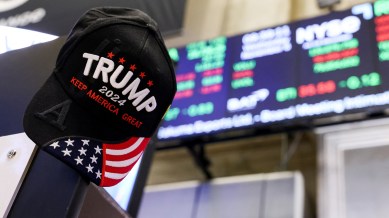Trump victory: Tech sector set to gain, but face challenges
Analysts and experts said there are several ‘ifs and buts’ relating to the opportunities for Indian tech firms.

The $245 billion Indian tech sector which employs around 5.4 million people are cautiously optimistic about the resounding victory of Donald Trump as the next US President. The return of Trump is expected to boost increased spending by US firms, leading to the possibility more revenue for Indian tech companies. This was reflected on the stock markets with IT Index rallying over four per cent, led by Infosys and TCS share which jumped over four per cent each.
Analysts and experts said there are several ‘ifs and buts’ relating to the opportunities for Indian tech firms. If the past record of Trump administration is any indication, Indian tech firms are set to gain from Trump’s new plans while H1-B visa holders are expected to face some uncertainties. While there have been concerns regarding Trump’s re-election with respect to tougher H1-B visas, its effect on Indian IT service companies may not be as significant as perceived. Over the past few weeks Indian IT service companies have corrected probably factoring some of this impact due to the re-election, said an analyst.
monthly limit of free stories.
with an Express account.
Manish Bandhari, the Founder, CEO & Portfolio Manager at Vallum Capital Advisors, said both the US and Indian IT sectors stand to gain from increased IT investments. However, offshoring might face challenges if Trump encourages more jobs in the US. A cut in corporate tax by Trump is likely to bring more business for the Indian tech companies. Under Trump’s first term, IT companies grew at a CAGR of 13 per cent during 2016-2020 and the IT index generated a return of 45 per cent despite challenges on visa and offshoring, he said.
“Trump’s proposal to cut the corporate tax rate from 21 per cent to 15 per cent is likely to ease budgetary pressures for US enterprises and businesses which augurs well for Indian IT service companies which have seen their IT service revenue growth rates plummet over past several quarters due to restraint exercised by their clients on discretionary spends. Overall, we see Trumps re-election as positive for Indian IT services companies,” said Shaji Nair, Research Analyst at Sharekhan by BNP Paribas.
“We may see changes in the nature of government spending towards supply side, as against consumption. Focus will be on incentivising companies through tax reductions. It is to encourage more capacities coming up in USA,” said Vaibhav Sanghavi, Chief Executive Officer of ASK Hedge Solutions. “From a sector perspective, we may see some sentimental impact on IT services as companies might have increased investment post some savings in potential tax decreases.”
However, Trump’s victory could likely result in more spending in the US, which could also translate into inflation remaining somewhat elevated. At the same time, it would also mean stronger dollar but more trade barriers, said Anitha Rangan, Economist, Equirus.
“India’s IT sector might also see a slowdown in demand, as a trade war and economic slowdown could reduce discretionary spending in the US,” said Nitin Aggarwal, Director, Investment Research and Advisory, Client Associates.
“Investors are closely monitoring the US election results, anticipating policy changes, trade agreements, and potential rate cuts that could strengthen the US economy and benefit IT companies through increased client spending,” said Ameya Ranadive, Sr Technical Analyst, StoxBox.
The Trump administration’s impact on H-1B visas has been significant. In his first term, denial rates for H-1B visas jumped to an average of 18 per cent from 2016 to 2020, compared to just 3.2 per cent under the Biden administration. Further, requests for evidence (RFEs) nearly tripled from 12 per cent to 34 per cent.
These changes have created uncertainty for high-skilled workers, making it tough for international students and immigrants to secure or maintain employment. There were 7.55 lakh H1-B visa admissions in 2023.
Trump introduced several rules to restrict the H-1B programme in the previous term. The Department of Labor’s wage rule increased minimum wages for H-1B workers, making it harder for employers to afford them. The US also proposed rule replaced the lottery with a ranking system based on salary level, prioritising higher-paid workers. H-4 visa holders, spouses of H-1B workers, also faced challenges. The million-dollar question is whether he will go for tough policies in the tech sector visas in the second term.